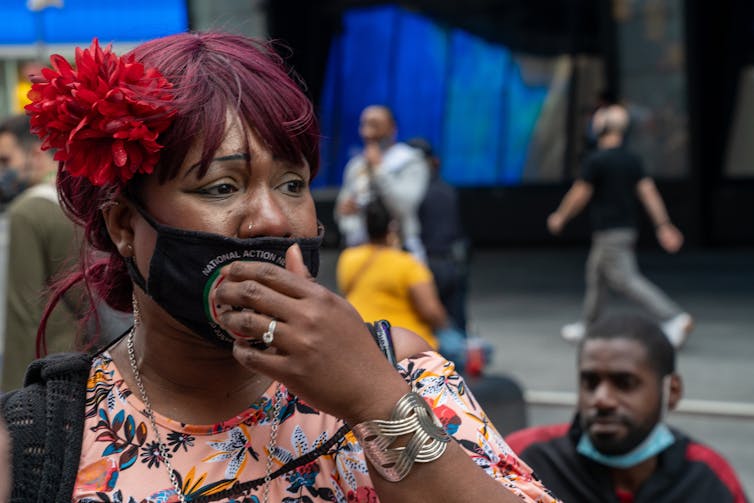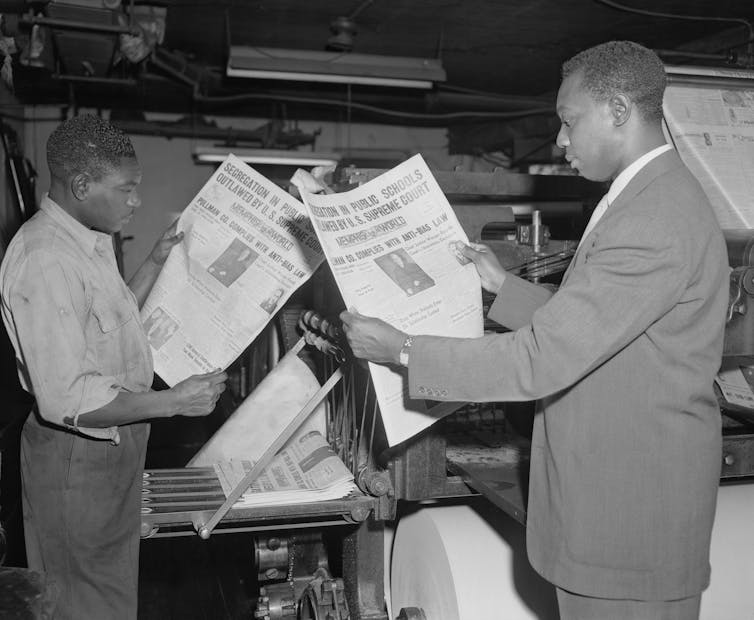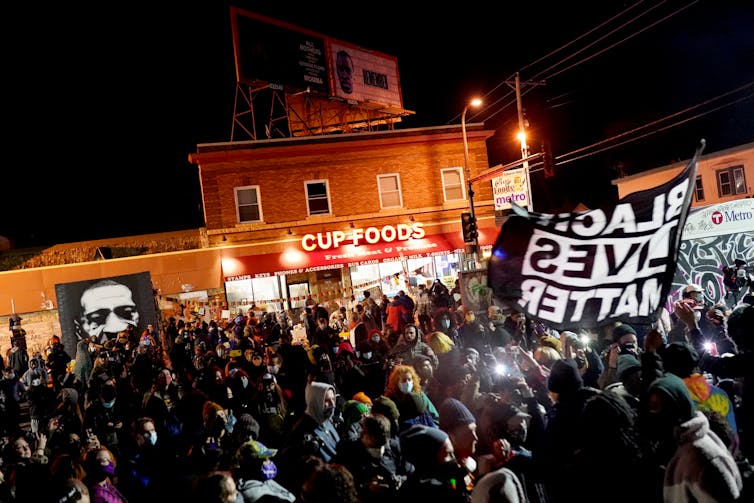'Landmark' verdicts like Chauvin murder conviction make history – but court cases alone don't transform society
- Written by Jennifer Reynolds, Professor of Law, University of Oregon
American courts in 2021 have already handed down several potentially historic rulings, from the Supreme Court’s recent decision restricting voting rights in Arizona and potentially nationwide[1] to a Minnesota jury’s conviction of police officer Derek Chauvin for murdering George Floyd last year[2].
Cases like these are often called “landmark” cases, because they set forth ideas and ideals that may bring about significant changes in the political and legal landscape.
Many analysts considered the Chauvin trial, in particular, to be a landmark. In it, police officers actually testified against one of their own[3], which is rare, and the jury held[4] a white police officer criminally accountable for killing a Black man. On June 25, 2021, the judge sentenced Chauvin to 22.5 years in prison[5] for murdering Floyd after he attempted to use a counterfeit bill to buy cigarettes.
People all over the world have followed the Chauvin trial closely, as the culminating event after a year of global protests[6] against police brutality and racism.
Landmark trials may go down in history, but as a law professor[7] specializing in alternative dispute resolution, I know that they do not instantly transform the social order.
Courts are limited in the kinds of disputes they can hear and the sorts of relief they can provide. Moreover, major court cases and other moments of reform in American history often result in legislative backlash and a “recalibration,” as my colleague Stuart Chinn has argued[8]. Those reactions may slow or even undermine the momentum for social change.
And even famously “just” verdicts haven’t necessarily pushed U.S. society in a linear direction toward its constitutional ideals.
 A woman in New York weeps after the guilty verdict was announced in the Derek Chauvin murder trial on April 20, 2021.
David Dee Delgado/Getty Images[9]
A woman in New York weeps after the guilty verdict was announced in the Derek Chauvin murder trial on April 20, 2021.
David Dee Delgado/Getty Images[9]
Big verdicts, slow change
A well-known example is Brown v. Board of Education[10], in which the Supreme Court held unanimously that the doctrine of “separate but equal” in public schools violated the 14th Amendment.
The 1954 Brown decision, which ended legal segregation in the nation’s schools, inspired civil rights activists, drew broader attention to the struggle for racial equality and was instrumental[11] in enforcing and encouraging racial desegregation.
But the main objectives of Brown – integrating public schools and leveling the educational playing field – have not been realized[12].
Many schools are still effectively segregated[13], in part because of ongoing legal and practical challenges associated with integration. In the 1974 case Milliken v. Bradley[14], for example, the Supreme Court limited the ability of federal courts to compel integration across school districts. That decision, handed down 20 years after Brown v. Board of Education, has made it difficult if not impossible to fulfill Brown’s promise of integration.
 Brown v. Board of Education made front-page headlines seven decades ago, but school segregation remains a problem nationwide.
Bettmann / Contributor via Getty[15]
Brown v. Board of Education made front-page headlines seven decades ago, but school segregation remains a problem nationwide.
Bettmann / Contributor via Getty[15]
Another instructive example from the same era is Gideon v. Wainwright[16]. In the Gideon case, the Supreme Court held that under the Sixth Amendment, the state must provide attorneys to criminal defendants who could not otherwise afford them.
Following through on this constitutional mandate has proven difficult. Many parts of the country allocate grossly inadequate resources[17] to the defense of indigent defendants. New Orleans’ 60 public defenders, for example, handle approximately 20,000 cases each year, according to a 2017 report[18].
Without timely access to legal counsel, many low-income defendants languish in jail for prolonged periods[19] before their case gets to trial, while waiting to be assigned a public defender. Others are pressured into unwanted or unjust plea bargains[20] by lawyers buried under crushing caseloads.
Necessary but not sufficient
Law students learn by the end of their grueling first year that trials alone are not effective mechanisms for addressing complex social and political problems.
Yet landmark trials are important. Legal proceedings are opportunities to articulate and reinforce American ideals around equality and justice and to expose bias and unfairness. They calibrate and restrain state power, test the merit of legal claims and create a public record.
Trials are an official public rendering of guilt or liability. Without them, the United States would lose much of the law’s ability to inspire and call attention to social change.
But as the Brown and Gideon cases show, legal decisions grounded in constitutional ideals of equality and justice do not automatically lead to an individual or collective moral reckoning.
Implementing the aspirational ideals set forth in landmark verdicts requires legislation, systems design, negotiation, collaboration, dialogue, activism and education.
Legal alternatives, too, such as restorative justice – which provides both perpetrators and victims with alternative routes to accountability and healing[21] – increasingly are recognized as crucial tools for managing individual disputes and moving society toward greater justice.
Assessing the Chauvin trial
The legal proceedings around George Floyd’s murder aren’t actually over yet.
Still to come are the prosecution of the other Minneapolis officers present at Floyd’s killing[22] and a federal civil rights case against Chauvin and his fellow officers. There will likely be an appeal process, too; legal verdicts can be overturned.
Ultimately, however, the meaning of the Chauvin murder trial within the larger context of the struggle for racial justice will depend, in part, on how people outside the courtroom respond to calls for reform.
 Minneapolis residents celebrate the Chauvin guilty verdict at the site of George Floyd’s murder.
Nathan Howard/Getty Images[23]
Minneapolis residents celebrate the Chauvin guilty verdict at the site of George Floyd’s murder.
Nathan Howard/Getty Images[23]
This explains why so many people reacted[24] to the Chauvin verdict with relief and also something akin to dissatisfaction. They realized that one guilty verdict, standing on its own, is not enough to address persistent and systemic inequities in the United States.
Police departments and officers, city officials, activists, community members, business owners, state and federal actors – all of these people share collective responsibility for defining George Floyd’s legacy in modern American history[25].
Landmark cases are moments in time; legacies unfold over generations. If Americans want safer communities and more ethical policing, the work starts now.
[Get the best of The Conversation, every weekend. Sign up for our weekly newsletter[26].]
References
- ^ restricting voting rights in Arizona and potentially nationwide (www.cnn.com)
- ^ Derek Chauvin for murdering George Floyd last year (www.theguardian.com)
- ^ against one of their own (www.cnn.com)
- ^ the jury held (www.nytimes.com)
- ^ sentenced Chauvin to 22.5 years in prison (www.cnn.com)
- ^ global protests (www.dw.com)
- ^ law professor (scholar.google.com)
- ^ has argued (www.cambridge.org)
- ^ David Dee Delgado/Getty Images (www.gettyimages.com)
- ^ Brown v. Board of Education (www.law.cornell.edu)
- ^ was instrumental (www.naacpldf.org)
- ^ have not been realized (theconversation.com)
- ^ still effectively segregated (www.epi.org)
- ^ Milliken v. Bradley (www.law.cornell.edu)
- ^ Bettmann / Contributor via Getty (www.gettyimages.com)
- ^ Gideon v. Wainwright (www.law.cornell.edu)
- ^ inadequate resources (fordhampoliticalreview.org)
- ^ 2017 report (www.pewtrusts.org)
- ^ jail for prolonged periods (www.kansascity.com)
- ^ unwanted or unjust plea bargains (www.theatlantic.com)
- ^ provides both perpetrators and victims with alternative routes to accountability and healing (www.nytimes.com)
- ^ other Minneapolis officers present at Floyd’s killing (www.reuters.com)
- ^ Nathan Howard/Getty Images (www.gettyimages.com)
- ^ people reacted (www.npr.org)
- ^ modern American history (www.dw.com)
- ^ Sign up for our weekly newsletter (theconversation.com)

















